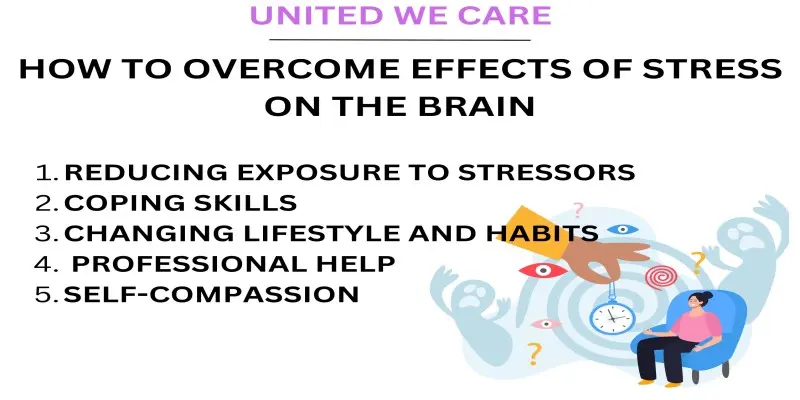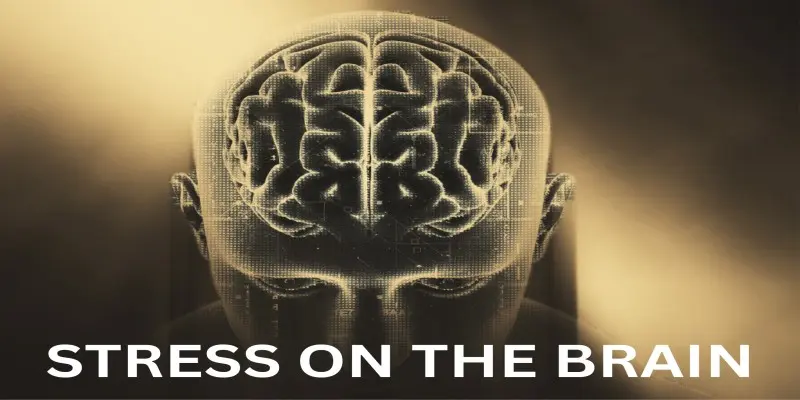Introduction
“Stress is a natural reaction to challenges, but when it persists, it takes a toll on our mental well-being. Prolonged stress can alter the structure and function of the brain, leading to cognitive and memory impairments, and increasing the risk of mental illness. This piece explores the mechanisms through which stress affects the brain, its underlying causes, and strategies to enhance resilience. My aim is to provide insight and hope amidst adversity. Just as stress can change the brain, targeted care can promote its recovery. Together, we can navigate through difficult times.”
Effects of Stress on the Brain
Stress influences the brain in various ways, both temporarily and over the long term. In the short term, it triggers the amygdala, which controls emotions, leading to the fight-or-flight response for survival. However, it also impairs the prefrontal cortex, diminishing focus, learning, and memory capabilities.
With chronic stress, crucial systems become disrupted. The HPA axis, responsible for managing stress reactions, is thrown off balance, resulting in an overflow of cortisol throughout the body. This excessive hormone release damages the hippocampus, affecting memory and causing neuron loss, leading to impaired recall. Additionally, neurogenesis, the process of generating new neurons, slow down, limiting the brain’s ability to adapt.
Over time, chronic stress can also alter gene expression patterns in the brain, affecting its function on a genetic level. These changes may increase susceptibility to anxiety, depression, PTSD, and other mental illnesses. Disruption of neurotransmitters and lowered immunity further contribute to elevated risks.
Despite the damaging effects of stress, the brain’s plasticity offers hope. Just as stress can rewire neural circuits, targeted care and interventions can reshape them. While the toll on the mind and body can be significant, recovery is achievable. By understanding the adverse impacts of stress, we can tap into our inherent resilience. Together, through gradual steps, we can cultivate brains that flourish.
How Does Stress Affect the Brain
Stress sets off a series of reactions in the brain and body, weaving through interconnected systems.
- Initially, the amygdala signals the alarm, prompting the hypothalamus into action. This triggers the sympathetic nervous system, flooding us with adrenaline to prepare for response. Additionally, the hypothalamus signals the pituitary gland to release cortisol, the primary stress hormone.
- Cortisol attaches to receptors in vital brain areas like the hippocampus, prefrontal cortex, and amygdala, which play crucial roles in memory, focus, and emotions. Here, it regulates activity and gene expression. Cortisol also impacts neurotransmitters such as serotonin and dopamine, influencing mood, motivation, and feelings of reward.
- While acute stress can sharpen attention, boost memory, and facilitate learning, chronic stress yields opposite results. Prolonged exposure to cortisol hampers plasticity and the growth of new neurons in the hippocampus and prefrontal cortex. As a result, their size and connectivity diminish. Over time, this impairs memory, focus, and the regulation of emotions. The amygdala becomes overly active, while the prefrontal cortex weakens.
However, just as stress shapes the brain, nurturing care can reshape it. Understanding these intricate connections gives us the ability to counteract stress’s impact. Our brains retain their flexibility throughout life, and where we direct our attention, our neural pathways will follow suit.
Causes of Effects of Stress on the Brain
The origins of stress’s impact on the brain stem from both external and internal sources.
- Stressors: Externally, stressors emerge from threats to our physical well-being, mental state, or interpersonal connections. Physical stressors such as illness or injury trigger alarm responses. Emotional stressors, such as anxiety, anger, or grief, also provoke distress signals. Additionally, social stressors like conflicts, rejections, and perceptions of injustice inflict emotional pain.
- Biological Factors: Internally, biological factors play a role in modulating our reactions.Genetic differences affect sensitivity – genes influencing cortisol receptors, serotonin, and BDNF shape resilience. Epigenetic changes to gene expression occur as adaptation. Hormones like oestrogen, thyroid, and growth hormones further tune the stress response.
- Perception and Appraisal Influence: Psychologically, perception and appraisal influence what we find threatening, such as coping styles, locus of control, self-efficacy, and optimism colour our interpretations.
- External Stressors: By recognising the many forces that drive stress’s burdensome effects, we gain power. External stressors can be modified, coping skills learned, and dysfunctional thinking reframed. Our biology is not our biography – with care, neural circuits rewire. Even in darkness, light remains.
Together, we can overcome the toll of stress through wisdom, community, and perseverance. Our dynamic brains can be reshaped – where attention goes, neural connections will follow.
How to Overcome Effects of Stress on the Brain
While stress can tax our minds, its effects need not be permanent. There are many ways to curb its harmful impact and inspire renewal.

- Reducing exposure to stressors: Reducing exposure to stressors, whether physical, emotional, or social, prevents continuous overload. Avoid or modify sources of strain when possible.
- Coping Skills: Enhancing coping skills equips us to navigate challenges. Adopt positive, problem-focused strategies like seeking support, expressing emotions, reframing situations, and setting goals. Adaptability is a strength.
- Changing Lifestyle and Habits: Improving lifestyle habits also bolsters resilience. Exercise, nutritious eating, restful sleep, relaxation, and mindfulness counterbalance stress. Care for the body uplifts the spirit.
- Professional Help: When overwhelmed, professional help provides objective guidance. Therapists offer psychological treatment, from talk therapy to medication, to alleviate distress.
- Self-Compassion: Even in darkness, light remains if we seek it. Though stress changes the brain, focused care can reshape it. By understanding our challenges and cultivating self-compassion, we can find equilibrium. Together, step by step, we will weather the storms. And through wisdom and community, we will thrive.
Conclusion
Stress is an innate response, helping us rise to challenges. But when it becomes chronic, it reshapes the brain in harmful ways – shrinking size, disrupting function, and diminishing cognition and memory. Mental health suffers as well, with escalated risk of anxiety, depression, and more.
The causes are multifaceted, spanning external stressors and internal factors. But so, too, are the solutions. We can reduce exposure, build coping skills, improve lifestyles, and seek help when needed. Recovery takes effort but is within reach.
You can always talk to our experts at United We Care to learn more about how to tackle stress. In case any of this information resonates with you, you will surely benefit from an expert consult.
References
- S. Khursheed, C. Vuppalapati, M. S. Khan, N. Raghu, “A System To Detect Mental Stress Using Machine Learning And Mobile Development,” in IEEE International Conference on Machine Learning and Cybernetics (ICMLC), 2018.
- O. AlShorman, M. Masadeh, A. Alzyoud, M. B. Bin Heyat, “The Effects of Emotional Stress on Learning and Memory Cognitive Functions: An EEG Review Study in Education,” in Sixth International Conference on e-Learning (econf), 2020.
- H. Kim, D.-K. Jeong, J.-Y. Kim, “Stress & Emotion Recognition Using Sentiment Analysis and EEG Signals,” in IEEE International Conference on Computational Intelligence and Computing Research (ICCIC), 2017.
- R. Katmah, F. Al-Shargie, U. Tariq, F. Babiloni, F. Al-Mughairbi, H. Al-Nashash, “A Review of EEG-Based Stress Detection Methods,” in IEEE Journal of Biomedical and Health Informatics, 2020.
- O. AlShorman, M. Masadeh, A. Alzyoud, M. B. Bin Heyat, “The Impact of Stress on Cognitive Functions: An EEG Study,” in 2019 IEEE 19th International Conference on Bioinformatics and Bioengineering (BIBE), 2019.
- H. Yaribeygi, Y. Panahi, H. Sahraei, T. P. Johnston, A. Sahebkar, “A Review of the Effects of Stress on Brain Functioning and Cognition,” in IEEE Access, 2019.
- J. Agrawal, M. Gupta, “Stress Detection Using EEG Signals and Machine Learning Techniques,” in 2018 IEEE International Conference on Systems, Man, and Cybernetics (SMC), 2018.
- R. Katmah, F. Al-Shargie, U. Tariq, F. Babiloni, F. Al-Mughairbi, H. Al-Nashash, “The Effects of Stress on Brain Activity and Connectivity: An EEG Study,” in 2017 IEEE International Conference on Systems, Man, and Cybernetics (SMC), 2017.










